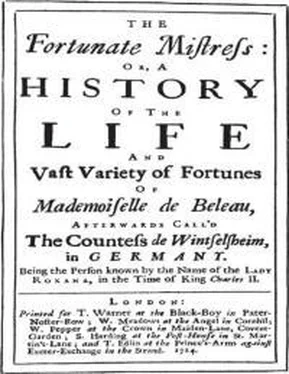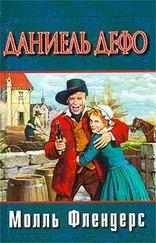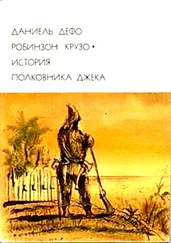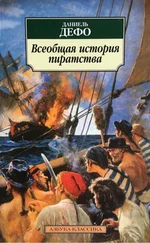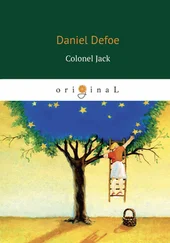her Spirits : animal spirits. See note 257.
Cistern : a large basin or case for holding bottles, frequently used at the dining table.
doubt : fear.
Bite : swindler.
his Goldsmith’s : Because they had strong rooms, goldsmiths acted as depositories for money and other valuables.
Goldsmith’s Bills : see note 209.
the English East-India Company : The English Company was the largest and most important of the eight European companies trading with India and the Far East. Established at the end of the sixteenth century, it became the dominant power in India until it handed over power to the British Government in 1858.
Assignments : negotiable documents secured by revenue or property; in effect bills.
5800 Crowns : worth £1,334. See note 111.
30000 Rixdollars : 30,000 Rijksdaalders were worth £6,660.
an Account-Courant : a corruption of compte-courant, not a modern current account with a bank, but a private financial arrangement between two people.
Bottomree : bottomry, a maritime contract by which a shipowner borrows money to finance a voyage, pledging the vessel (or bottom) as security.
a Right of Reversion : a written right of succession to an estate. In English law reversion means that the estate (leased or granted, often for life, to someone who has no hereditary claim to it) reverts to the original grantor, or his heirs, on the death of the grantee or when the grant expires.
Fee-Farm Rents : the rent paid for an estate held in absolute possession but subject to a perpetual fixed rent.
than ever Belshazzer did at the Hand-writing on the Wall : Daniel 5:1–30.
a Moth and a Catterpiller among it : echoes Matthew 6:19–21.
Fire in his Flax : a traditional proverbial expression of the ease of destruction, similar to the modern expression ‘a match to a powder-keg’.
Pretence : reason, purpose.
a Dart struck into the Liver : Proverbs 7:22–23. The allusion is curiously inappropriate since the reference is to a man seduced by the wiles of a harlot. Defoe uses it in that sense in Moll Flanders (Penguin Books, 1978), p. 218.
gay : dissipated, immoral.
a Reversion : not transferred outright, but as a right of succession at some future time (usually after the death or retirement of the holder). See note 293.
fell : fell in, was obtained.
as all the Brothers of a Count are call’d Counts : Unlike the English practice, by which titles of nobility are acquired by right of primogeniture, continental practice permitted all the sons of a count to assume the title.
by Courtesie : courtesy titles have no legal validity but are recognized by social custom.
conjur’d implored, appealed solemnly to.
melancholly : often used in a much stronger sense in Defoe’s day, suggesting severe depression or even mental derangement.
Vapours : see the Introduction, pp. 18–19.
a Bedlam : a lunatic. See note 254.
the German Princess : Mary Carleton, born Mary Moders in Canterbury in 1634 or 1635. She became a celebrated figure in London in 1663 when, posing as a wealthy German noblewoman, she made a bigamous marriage with John Carleton, and was soon afterwards exposed and tried at the Old Bailey. Several accounts were written of her life (including those by herself and by John Carleton) and a play entitled The German Princess was put on at the Duke’s House, Lincoln’s Inn Fields, in 1664 with Mary Carleton in the title role. She was hanged as a thief in 1674.
promiscuous : indiscriminately mixed (in social class).
Redriff : Rotherhithe (commonly called Redriff in the seventeenth and eighteenth centuries), an area on the south bank of the Thames between Bermondsey and Dept-ford, long inhabited by seafarers (including Swift’s Gulliver).
discover : show.
discover herself : maker herself known, reveal her feelings.
within her : between her and the shore.
over and above : great, considerable.
clapp’d in : burst in.
Face : disguise or outward show. The phrase ‘carried its own Face with it’ means ‘made the matter appear natural’.
after the Italian Way : probably like a mantua. See note 103.
my Head : see note 78.
more shap’d to the Body, than we wear them since : The old seventeenth-century woman’s dress, consisting of a skirt and tight-fitting bodice (boned and long-waisted until 1710), gave way in the early eighteenth century to the looser sack (often spelled sac or sacque) introduced from France.
at one : the same.
dangerous… dangerous : Defoe plays on the word ‘dangerous’, which Roxana first uses in the sense of ‘particular’ or ‘perceptive’ and then in the sense of ‘threatening’ or ‘vengeful’. The meaning is that the QUAKER, because she had a penetrating intelligence, would certainly see the implications of the Turkish dress even more than the girl, but that this was less alarming because she (the QUAKER) would not use the information to threaten Roxana.
what a Place she had of it : what sort of position she had there.
Pieces of Gold : guineas; cf. note 23.
Portion to put her off : dowry to dispose of her in marriage.
great : intimate, ‘thick’. Johnson in the Dictionary calls it ‘a low word’.
behind of : still to be explained about.
the Pallmall is not far from Whitehall : Whitehall was the official royal residence in London until 1697, but Pall Mall was inhabited by many people (including Charles II’s mistress, Nell Gwynn) who were at court.
paint : use make-up.
Outlandish : foreign.
Comedian : an actress, originally in comedies. The practice of employing actresses in the female roles (formerly taken by boys) was introduced from France with the revival of the theatres at the Restoration. Actresses had a reputation for sexual immorality, and several of them, including Nell Gwynn, became well-known courtesans.
Читать дальше
